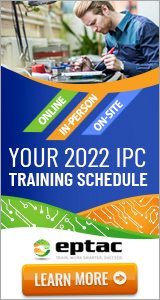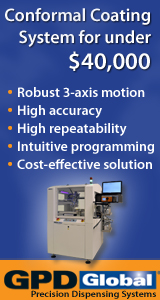Several Indium Corporation experts will share their technical knowledge with attendees at the Surface Mount Technology Association’s International Conference and Exhibition (SMTAi) from Sept. 28-Oct. 2 in Rosemont, Ill.
Dr. Ning-Cheng Lee, vice president of technology, will deliver two presentations. Low-Porosity Pressureless Sintering of Novel Nano-Ag Paste for Die-Attach reviews the use of a newly-developed nano-Ag paste, which allows for a pressureless sintering die-attach process that creates sintered joints exhibiting very low porosity, high joint shear strength, and very good electrical and thermal conductivity.
Dr. Lee will also present Reliability of PCB Solder Joints Assembled with SACm™ Solder Paste. This presentation evaluates the assembly joint appearance, wetting and voiding behavior, and solder balling of SACm™ as solder paste, as well as BGAs manufactured with SAC305 balls and chip capacitors. The results of drop test performance, TCT reliability, and the microstructure of solder joint evaluations with and without thermal aging are discussed.
Tim Jensen, senior product manager for engineered solders, will present Advancement of Solder Preform Technology to Reduce QFN Voiding. This paper explains how the use of solder preforms can minimize the excessive wicking down the via, while producing a solder joint with adequate stand-off and very low voiding.
Dr. Ron Lasky, senior technologist, will present two papers. Risk and Mitigation for Tin Pest and Tin Whiskers outlines the reliability concerns of both of these phenomena. It also includes a review and analysis of the varying strategies to address each of them.
Dr. Lasky’s second presentation, A New Approach to Compare Weibull Curves, will review the basics of Weibull analysis, including its origin and relationship to other statistical distributions; various calculations for the basic Weibull parameters of shape and scale for several data sets; and how to address several questions that should be asked when comparing Weibull curves from different samples.
Dr. RunSheng Mao, research chemist, will present Complicated Board Programming for Automated Printed Solder Paste Inspection without CAD Data Files. This paper describes a unique technique for evaluating solder paste printing performance objectively, using a “virtual part” approach to program test boards for SPI operation without CAD data files.
SMTA International is an annual technical conference and exhibition on electronics assembly and advanced packaging that draws industry professionals from around the world.
Dr. Lee is a world-renown soldering expert and an SMTA Member of Distinction. He has extensive experience in the development of high-temperature polymers, encapsulants for microelectronics, underfills, and adhesives. His current research interests include advanced materials for interconnects and packaging for electronics and optoelectronics applications, with an emphasis on both high performance and low cost of ownership.
Jensen is an SMTA-certified process engineer. He earned his bachelor’s degree in chemical engineering from Clarkson University. He has spent more than 15 years working with customers troubleshooting and optimizing SMT process lines, and solving issues such as head-in-pillow, graping, and QFN voiding. Jensen is responsible for Indium Corporation’s most diverse product group, which includes solder preforms, wire, ribbon, and foil, as well as thermal interface materials.
Dr. Lasky, holder of the prestigious SMTA Founder’s Award, is a world-renown process expert and an instructional professor at Dartmouth College. He has more than 25 years of experience in electronics and optoelectronic packaging and assembly. He has authored or edited six books and numerous technical papers and holds several patent disclosures. Dr. Lasky also authors a technology blog, which can be found at www.indium.com/drlasky.
Dr. Mao has co-authored more than 40 papers that have been published in scientific journals and presented at technical conferences worldwide. Dr. Mao has led the development of a new generation of Indium Corporation water-soluble solder paste products, including: Indium6.2, Indium6.3, and Indium6.8 for tin-lead; and Indium3.1, Indium3.1AF, Indium3.2, and Indium3.2HF for lead-free alloys. He also played an important role in developing BiAgX® high-temperature lead-free solder paste, which is used as a substitute for high lead-containing solder paste. Dr. Mao earned his bachelor’s and master’s degrees in chemistry from the University of Science and Technology in China, and a doctorate in chemistry from the University of Salford, UK.
Indium Corporation is a premier materials manufacturer and supplier to the global electronics, semiconductor, solar, thin-film, and thermal management markets. Products include solders and fluxes; brazes; thermal interface materials; sputtering targets; indium, gallium, germanium, and tin metals and inorganic compounds; and NanoFoil®. Founded in 1934, Indium has global technical support and factories located in China, Malaysia, Singapore, South Korea, the United Kingdom, and the USA. For more information about Indium Corporation, visit www.indium.com or email abrown@indium.com.






